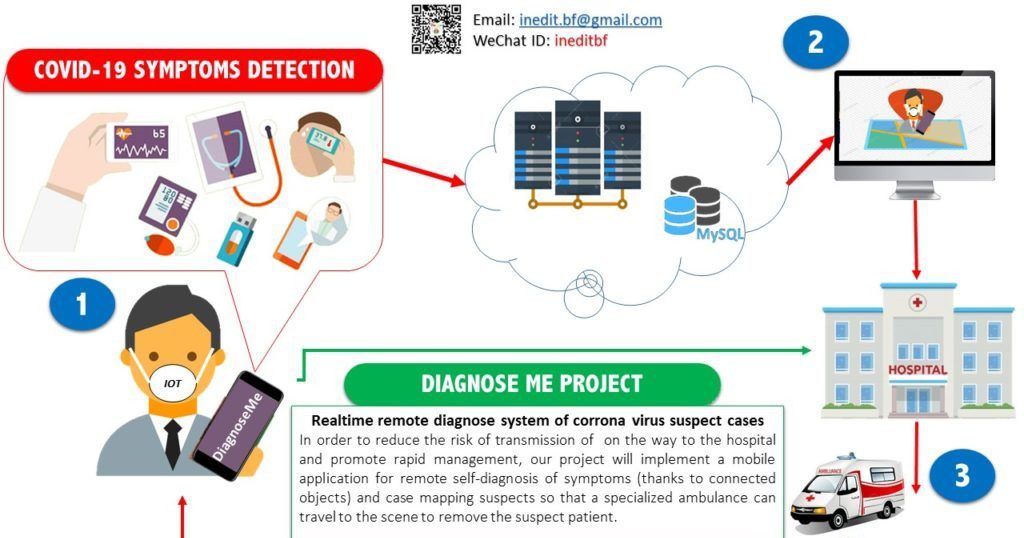
Young engineers from Burkina Faso together with a colleague studying in Wuhan launched DiagnoseMe app to detect symptoms of Covid-19

This adventure began in late January, when there were still no cases of Covid-19 in Burkina Faso and an international hackathon, Hack For Wuhan, aiming at developing solutions to fight the pandemic was held in Wuhan, China, the epicentre of the pandemic. Only two African teams out of 56 groups from 33 countries participated in this international competition. One of the only two African teams was the Adama Sy Traore team, consisting of four participants from Burkina Faso: a doctor, two engineers members of Faso Civic association and a Burkinabé student at Wuhan University of Technology. They were among the 12 finalists.
Adama Sy Traore, engineer, teacher and founder of the Faso Civic youth association, in Ouagadougou, capital of Burkina Faso, spoke to Outriders about their app:
When did you start to work in technology?

Technology has always been a passion for me before being a profession. Since 2010, I have been mainly involved in the study and development of technological innovation projects. I work to propose innovative solutions (hardware and software) to help my contributors to design better products, services and manufacturing processes or to improve them.
Tell us more about Faso Civic.
Faso Civic is an association which aims to promote good citizenship and citizen entrepreneurship. It was officially launched in May 2019. It brings together ten young graduates who have decided to put their skills at the service of the community In Burkina Faso and citizen well-being through research and development of inclusive, innovative projects in the fields of education, agriculture, security, health and many others. We firmly believe that young people are the best players in local development.

What about DiagnoseMe? How many people have participated in it?
The adventure of the DiagnoseMe project began in March 2020, with a team of four people consisting of a doctor, a civil engineer (a member of Faso Civic), a Burkinabé student at the Technological University of Wuhan and myself. Before the first cases of Covid-19 appeared in our country, we participated in the Hack For Wuhan, an international hackathon against Covid-19 from the Wuhan2020 Open Source Community. Given the progression of the epidemic, our country was not going to be the only one that was not affected. Only two African teams out of 56 from 33 countries participated in this international competition. During this competition, we worked to improve the application with the advice of several mentors working in large digital companies. Our application was ranked among the top 12 finalists whose solutions caught the attention of the jury of the Wuhan2020 Open Source Community.
After the Hackathon in Wuhan, how has the feedback been in your country, Burkina Faso?
The DiagnoseMe solution was also awarded the 1st prize winner out of 64 projects presented in the Innov ‘Challenge COVID-19 Burkina Faso competition, organized by the ministry in charge of the development of the digital economy and the Ministry of Health in partnership with the UNDP. This competition aimed to select the best innovative solutions that complement the digital actions and initiatives undertaken by the Burkinabé Ministry of Health. Since then, we have been supported by two students of a Master Degree in Computer Science in Burkina.

How does the app work?
The DiagnoseMe app allows its users to develop a self-diagnosis by assessing their level of risk (contacts, travel, temperatures, respiratory rates, other signs, signs of severity) and to be put in touch with agents of the supervision platform of the ministry of health. The objective is to avoid crowds in health centres, which could become another source of contamination. A monitoring interface for healthcare professionals allows real-time monitoring and management of requests from the mobile application, geolocation of suspect cases and epidemiological monitoring. The app was developed in French and three local languages through an inclusive mechanism for the entire population – adults, younger people, people with visual or hearing disabilities.
Apart from Faso Civic, have you been supported by other companies or institutions?
In addition to the Burkinabé authorities and the UNDP through the prize of the Innov’Challenge COVID-19 Burkina competition, we are supported by partners such as the French platform of companies for global health (SEE / B4GH) and YUP / Société General Burkina Faso, which help us in promoting the solution internationally as well as nationally.
What would you say to the people who have concerns about privacy and track-tracing apps?
The applications do collect specific data from users. We are often right to worry about the use of this data. But I think it’s for the good of everyone, of humanity. Preservation of health is essential, and certain confidential data can save our lives. Each country has laws that manage the use of this data, which is most often hosted by the country’s health authorities.
After the pandemic, do you think the app could be useful for other activities?
The objective sought by DiagnoseMe is to prevent the spread of an epidemic and allow the rapid management of suspected cases. Efficient epidemiological surveillance helps curb the epidemic and eradicate the disease. The concept of DiagnoseMe could be applied to other diseases such as tuberculosis, malaria, Ebola, etc. It can also be fully used by all countries, making some small adaptations to the language and the maps. If someone is interested in DiagnoseMe technology, they can contact us; it would be our pleasure to transfer skills to them.























